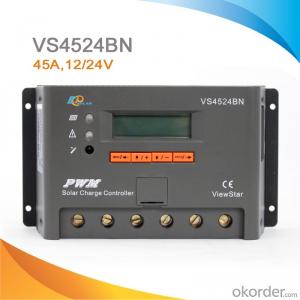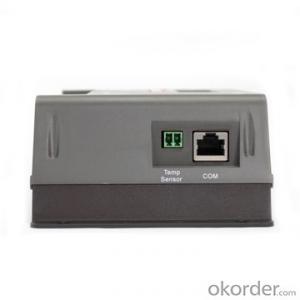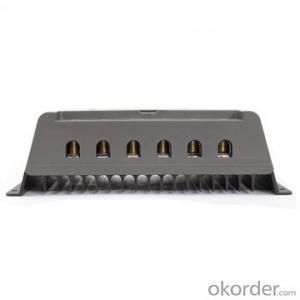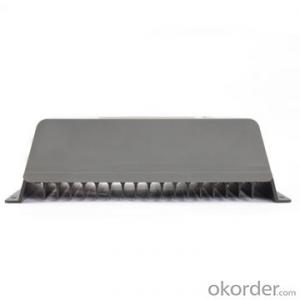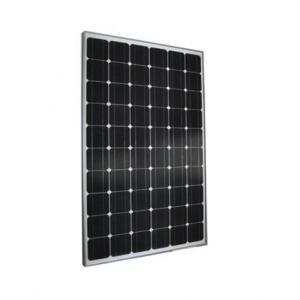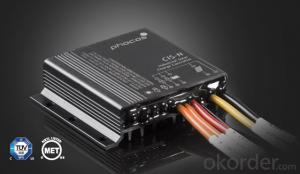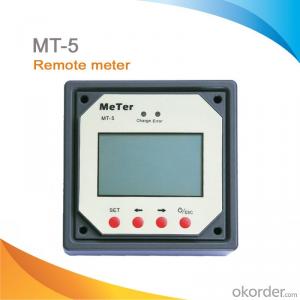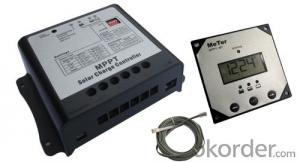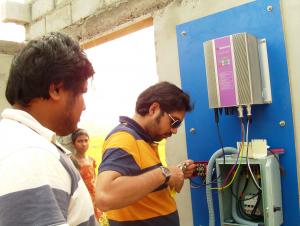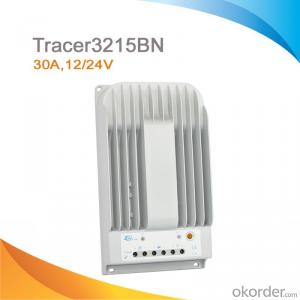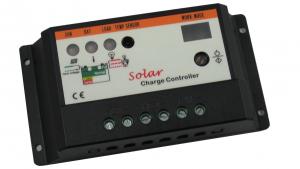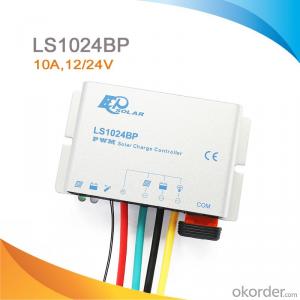LCD/LED High Quality PWM Solar System Charge Controller/Regulator with CE ROHS,45A 12V/24V ,VS4524BN
OKorder Service Pledge
OKorder Financial Service
You Might Also Like
Features:
·Excellent EMC design
·32 bit MCU with high speed
·High efficient Series PWM charging
·Four battery type options: Sealed, Gel, Flooded, and USER
·Intelligent lighting and timer control for solar lighting system
·12 bit A/D high-precision sampling to ensure accuracy
·Use MOSFET as electronic switch
·Full control parameters setting and modification, diversified load control mode
·Humanized design of browser interface, undertake every operating conveniently
·Temperature compensation
·Adopt graphics dot-matrix LCD screen and HMI (human-machine interface) with 4 buttons,integrated menu displaying and operation
·Energy statistics function
·RS485 ports with MODBUS communication protocol
·Optional PC monitoring software and remote meter for real-time monitoring and battery management parameter setting
·Field upgradable firmware
Electronic Protections:
·PV short circuit protection
·PV reverse polarity protection
·Battery overcharge protection
·Battery over discharge protection
·Battery reverse polarity protection
·Load overload protection
·Load short circuit protection
·Overheating protection
Specification:
Model | VS1024BN | VS2024BN | VS3024BN | VS4524BN | VS6024BN |
Nominal system voltage | 12V/24V auto work | ||||
Rated battery current | 10A | 20A | 30A | 45A | 60A |
Rated load current | 10A | 20A | 30A | 45A | 60A |
Max. battery voltage | 32V | ||||
Equalize charging voltage | Sealed: 14.6V, Flooded: 14.8V, User-defined: 9~17V | ||||
Boost charging voltage | Gel: 14.2V, Sealed: 14.6V, Flooded: 14.8V, User-defined: 9~17V | ||||
Float charging voltage | Gel /Sealed /Flooded: 13.8V, User-defined: 9~17V | ||||
Low voltage reconnect voltage | Gel /Sealed /Flooded: 12.6V, User-defined: 9~17V | ||||
Low voltage disconnect voltage | Gel /Sealed /Flooded: 11.1V, User-defined: 9~17V | ||||
Self-consumption | ≤15mA(12V); ≤10mA(24V); ≤9mA(36V); ≤8mA(48V) | ||||
Grounding | Common negative | ||||
Temp. compensation | -3mV/°C/2V | ||||
Relative humidity | 10%~90% Non-condensation | ||||
Communication | RS485 / RJ45 interface | ||||
LCD temperature | -20°C ~ +70°C | ||||
Working temperature | -25°C ~ +55°C | ||||
Humidity | ≤95% N.C. | ||||
Enclosure | IP30 | ||||
Overall dimension | 162x85x40mm | 162x100x50mm | 200x103x58mm | 201x109x59mm | 205x129x67mm |
Terminals | 4mm2 | 10mm2 | 16mm2 | 35mm2 | 35mm2 |
Net weight | 0.2kg | 0.4kg | 0.7kg | 0.9kg | 1.3kg |
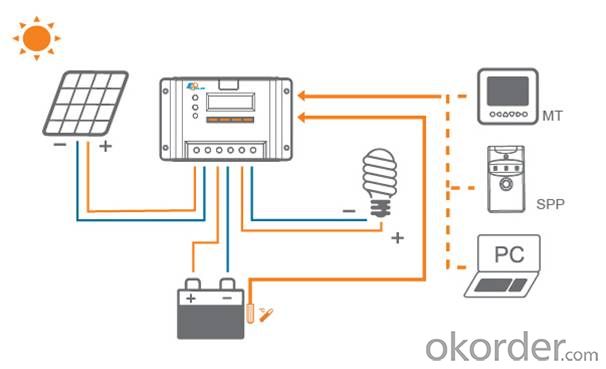
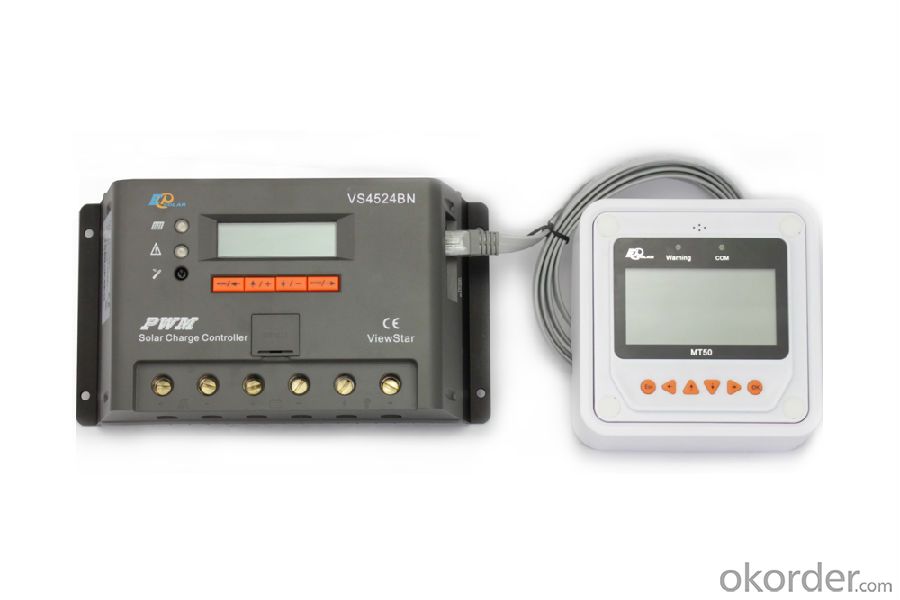
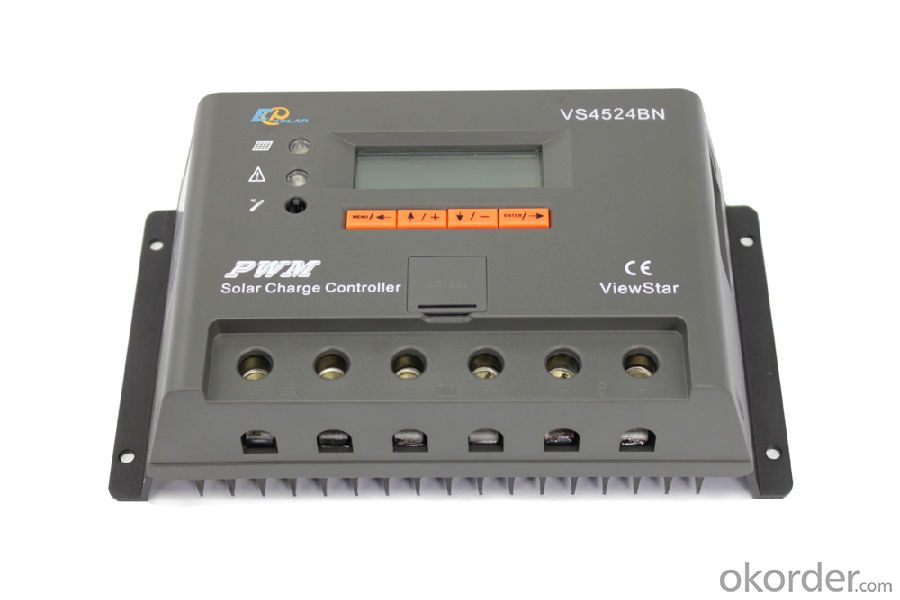
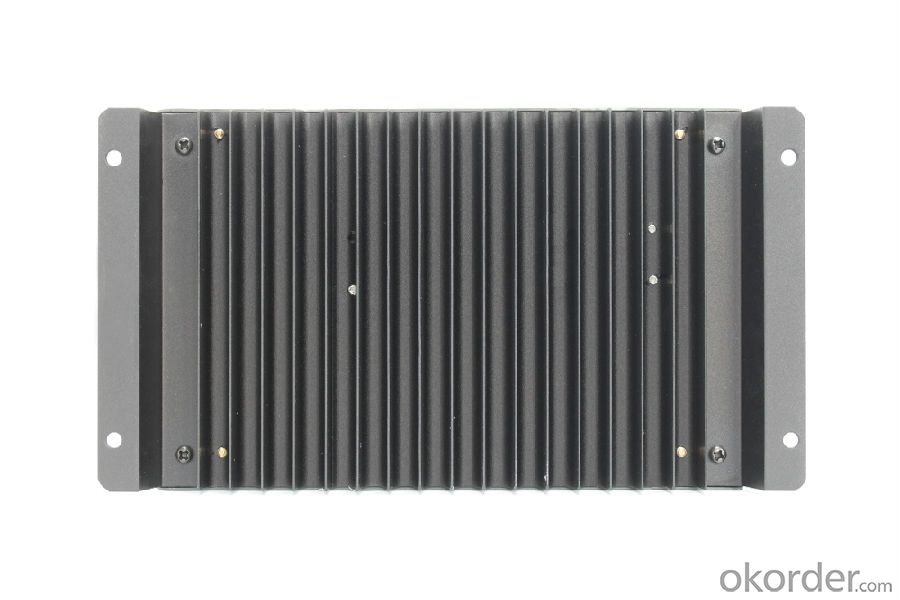
FAQ:
Q1. What is the voltage?
A1. Our 45/60A solar charge controller is 12/24/36/48V auto work.
Q2. What is the difference between MPPT&PWM?
A2. MPPT has higher efficiency, it can track the max power point and won't waste energy.
Q3. What is the efficiency of the MPPT controller?
A3. MPPT>99%, peak conversion efficiency>98%.
Q4. What is the waranty of product?
A4. 12 months.
Q5. What protection does your MPPT controller have?
A5. PV array short circuit, PV reverse polarity, Battery reverse polarity, Over charging, Output short circuit.
- Q:Can a solar controller be used with a solar-powered educational facility?
- Yes, a solar controller can be used with a solar-powered educational facility. A solar controller is designed to regulate the flow of electricity from the solar panels to the batteries, ensuring that the batteries are charged properly and preventing overcharging or damage. In a solar-powered educational facility, a solar controller would be essential in managing the power supply and optimizing the efficiency of the solar energy system.
- Q:What is the typical warranty period for a solar controller?
- The typical warranty period for a solar controller can vary depending on the brand and model. However, most reputable solar controller manufacturers offer warranties that range from 1 to 5 years. Some higher-end controllers may even come with extended warranties of up to 10 years. It is important to carefully check the warranty terms and conditions provided by the manufacturer before purchasing a solar controller to ensure that it meets your specific needs and expectations.
- Q:Can a solar controller be used in a solar-powered charging station?
- Yes, a solar controller can be used in a solar-powered charging station. A solar controller is an essential component of a solar power system as it regulates the voltage and current from the solar panels to ensure efficient charging of batteries or devices. In a solar-powered charging station, a solar controller would help optimize the charging process and protect the batteries from overcharging or damage.
- Q:What is the typical standby power consumption of a solar controller?
- The typical standby power consumption of a solar controller is generally very low, ranging from a few milliwatts to a few watts, depending on the specific model and features.
- Q:How does a solar controller prevent overvoltage in the system?
- A solar controller prevents overvoltage in the system by continuously monitoring the voltage levels of the solar panel and battery. When the voltage exceeds a certain threshold, the controller automatically regulates the charging process to prevent excessive charging and potential damage to the batteries. It accomplishes this by reducing the charge current or diverting the excess energy to a secondary load, thereby maintaining a safe and optimal voltage level in the system.
- Q:Can a solar controller be used with solar water pumps?
- Solar water pumps can indeed be used with a solar controller. The solar controller is an indispensable part of any solar power system, including solar water pumps. Its main function is to regulate and optimize the flow of electricity from the solar panels to the pump. Not only does it prevent battery overcharging and protect against voltage fluctuations, but it also ensures that the pump operates efficiently. Moreover, a solar controller may also come equipped with advanced features such as MPPT (Maximum Power Point Tracking) technology. This technology maximizes the power output from the solar panels, thereby further enhancing the performance of the solar water pump system. Consequently, it is highly recommended to utilize a solar controller in conjunction with solar water pumps in order to achieve better control, protection, and overall system performance.
- Q:Is it necessary to have a solar controller for a small solar system?
- Yes, it is necessary to have a solar controller for a small solar system. A solar controller helps regulate and control the charging and discharging of the batteries in the system, ensuring optimal performance and preventing overcharging or deep discharging, which can damage the batteries. Additionally, a solar controller provides important information about the system's performance and helps protect the system from various electrical issues, making it an essential component for a small solar system.
- Q:Can a solar controller be used with a solar panel cleaning system?
- Yes, a solar controller can be used with a solar panel cleaning system. A solar controller is responsible for regulating the power flow from the solar panels to the batteries or grid, ensuring optimal performance and protection. Using a solar controller in conjunction with a solar panel cleaning system can help monitor and control the power output, ensuring efficient cleaning operations without any potential damage to the panels.
- Q:How do I determine the size of a solar controller for my system?
- To determine the size of a solar controller for your system, there are a few factors you need to consider. Firstly, you need to determine the maximum current and voltage rating of your solar panels. This information is usually provided by the manufacturer of the panels. Next, you need to calculate the total wattage of your solar panels by multiplying the maximum current and voltage rating. This will give you an idea of the power output of your panels. Once you have the total wattage, you need to consider the charging current capacity of the solar controller. It is recommended to choose a controller that can handle at least 25% more current than the maximum output of your solar panels. This will allow for any fluctuations or variations in the system. Additionally, you should consider the battery capacity of your system. The solar controller should have a charging capacity that matches or exceeds the battery's capacity. This will ensure efficient charging and prevent any damage to the battery. Furthermore, it is important to consider the type of solar controller you need. There are different types available, such as PWM (Pulse Width Modulation) and MPPT (Maximum Power Point Tracking). MPPT controllers are generally more efficient and can handle higher voltages, but they are also more expensive. The type of controller you choose will depend on your specific system requirements and budget. Lastly, consider any future expansions or upgrades you may have in mind for your solar system. It is advisable to choose a solar controller that has some extra capacity to accommodate any future additions to your system. By considering factors such as the maximum current and voltage rating of your panels, total wattage, charging current capacity, battery capacity, type of controller, and future expansions, you can determine the appropriate size of a solar controller for your system.
- Q:Can a solar controller be used with solar-powered remote monitoring systems?
- Yes, a solar controller can be used with solar-powered remote monitoring systems. A solar controller regulates the charging and discharging of batteries in a solar power system, ensuring efficient and safe operation. By using a solar controller, the power generated by the solar panels can be properly managed and stored in batteries, which can then be used to power remote monitoring systems even during low sunlight conditions or at night.
1. Manufacturer Overview |
|
|---|---|
| Location | |
| Year Established | |
| Annual Output Value | |
| Main Markets | |
| Company Certifications | |
2. Manufacturer Certificates |
|
|---|---|
| a) Certification Name | |
| Range | |
| Reference | |
| Validity Period | |
3. Manufacturer Capability |
|
|---|---|
| a)Trade Capacity | |
| Nearest Port | |
| Export Percentage | |
| No.of Employees in Trade Department | |
| Language Spoken: | |
| b)Factory Information | |
| Factory Size: | |
| No. of Production Lines | |
| Contract Manufacturing | |
| Product Price Range | |
Send your message to us
LCD/LED High Quality PWM Solar System Charge Controller/Regulator with CE ROHS,45A 12V/24V ,VS4524BN
OKorder Service Pledge
OKorder Financial Service
Similar products
New products
Hot products
Hot Searches
Related keywords
